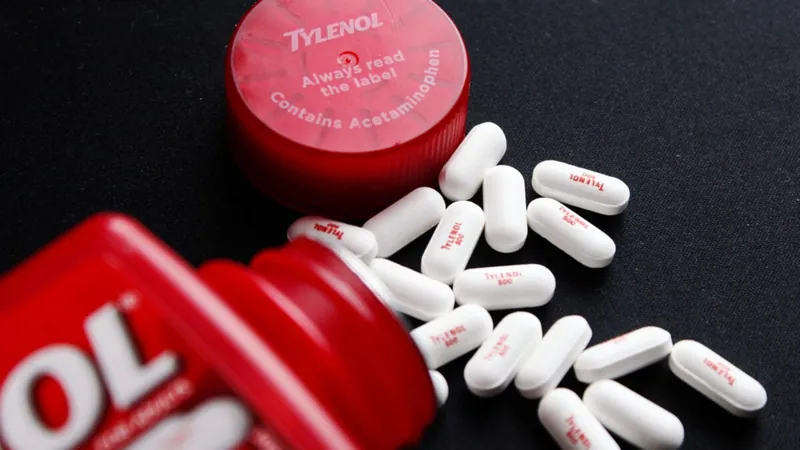
Could Tylenol Be the Shocking New Suspect in Autism Cases? Here’s the Controversial Scoop!
2025-09-08
Author: Ken Lee
RFK Jr. Takes Aim at Acetaminophen
In a surprising twist, Robert F. Kennedy Jr., U.S. Secretary of Health and Human Services, might be putting the spotlight on acetaminophen—the main ingredient in Tylenol—as a potential trigger for autism spectrum disorder. Reports suggest that HHS is gearing up to label its use during pregnancy as a risk factor for autism in a long-awaited announcement later this month.
The Inside Scoop
The Wall Street Journal first revealed this news, citing insiders familiar with the matter. Along with acetaminophen, the report is said to implicate low folate levels as another possible contributor to autism. While some studies hint at a link between Tylenol and autism, others firmly disagree, leading experts to caution that the current evidence may not definitively support this claim.
Acetaminophen: A Double-Edged Sword
Despite being the world’s go-to over-the-counter pain reliever and fever reducer, acetaminophen isn’t without its risks. Chronic or excessive use can lead to severe liver or kidney damage and is the leading cause of drug overdose-related liver failure in the U.S. However, many consider it safer for pregnant women compared to alternatives like NSAIDs or aspirin.
Is There a Real Risk?
Recent studies have raised concerns about the implications of taking acetaminophen during pregnancy. A recent review by Mount Sinai researchers indicated that prenatal exposure might heighten the risk of neurodevelopmental disorders, including autism and ADHD. They noted that acetaminophen can cross the placental barrier, potentially impacting fetal brain development.
The Debate Rages On
Nevertheless, experts remain unconvinced that Tylenol directly causes autism. A comprehensive Swedish-U.S. study analyzing children born between 1995 and 2019 found that while some initial data showed a slight autism risk associated with maternal acetaminophen use, a sibling comparison revealed no significant connection.
A Complex Web of Causes
Research suggests autism results from a mix of genetic and environmental factors. Since siblings share many of these influences, they offer a more precise lens for examining risks unique to individual pregnancies. The study authors concluded that the observed association was likely non-causal, hinting that external health factors could be misleading the results.
Skepticism Mounts
As autism rates climb, many experts believe enhanced detection and broadened diagnostic criteria are likely driving reported cases, rather than a true increase in prevalence. Given the weak evidence pointing to a link between acetaminophen and autism, skepticism abounds regarding the upcoming HHS report. When queried, HHS refrained from confirming any details before publication.
Coalition of Experts Responds
In light of RFK Jr.'s announcement, a newly formed Coalition of Autism Scientists, comprised of over 200 researchers nationwide, has voiced its dissent. They assert that it is ‘highly irresponsible’ to suggest direct links between exposures and autism when the science is intricate and uncertain. They caution that Kennedy's claims could instill unnecessary confusion and fear, emphasizing the importance of considering all relevant research.


 Brasil (PT)
Brasil (PT)
 Canada (EN)
Canada (EN)
 Chile (ES)
Chile (ES)
 Česko (CS)
Česko (CS)
 대한민국 (KO)
대한민국 (KO)
 España (ES)
España (ES)
 France (FR)
France (FR)
 Hong Kong (EN)
Hong Kong (EN)
 Italia (IT)
Italia (IT)
 日本 (JA)
日本 (JA)
 Magyarország (HU)
Magyarország (HU)
 Norge (NO)
Norge (NO)
 Polska (PL)
Polska (PL)
 Schweiz (DE)
Schweiz (DE)
 Singapore (EN)
Singapore (EN)
 Sverige (SV)
Sverige (SV)
 Suomi (FI)
Suomi (FI)
 Türkiye (TR)
Türkiye (TR)
 الإمارات العربية المتحدة (AR)
الإمارات العربية المتحدة (AR)